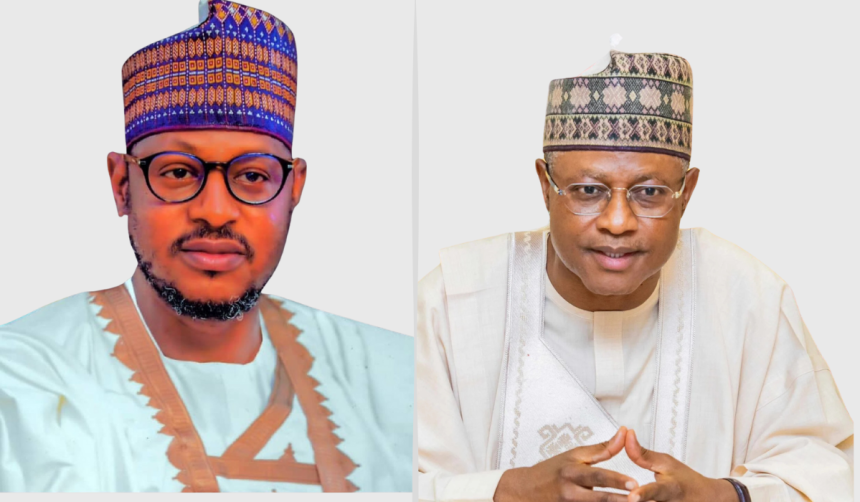Northern Governors from the North West region of the country have expressed the need for a review of the current revenue allocation formula, by ensuring that State and Local Governments receive fair and adequate allocations.
Governor Dikko Radda of Katsina State and his Kaduna counterpart, Governor Uba Sani who vented their views during the just-concluded House of Representatives’ Constitution Review North West Centre A public hearing held in Kaduna State, also expressed overwhelming support for the establishment of State Police, devolution of powers, retention of federal system and strengthening of existing Anti-Corruption agencies, State and Local Government creation, reservation of seats for women and people living with disability (PWDs), and other thematic areas.
Governor Radda said: “There is need for a review of the revenue allocation formula to take care of the proposed devolution of power, State Police, electricity generation/management, infrastructural development, traditional rulers, among others.”
To this end, he advocated for increase in the Local Government allocation from the current 20.60% to 24%; and State allocation from 26.72% to 31% while Federal allocation should be reduced from the current 52.68% to 45%.
He also expressed the State’s support for the implementation of a fair and progressive taxation system, reducing the burden on low-income earners and promoting economic growth.
While reiterating his administration’s resolve to the unity, stability and progress of Nigeria, Governor Rudda proposed stricter regulations on the campaign finance with a view to prevent money laundering and promote level playing field for all political actors as part of ongoing electoral reforms.
Governor Radda who was represented by the Commissioner of Justice and Attorney General, Hajia Fadilla Dikko said: “State Police: We support the establishment of state police to complement federal police efforts to enhance security at the grassroots level.
“Community Policing: The State supports the adoption of community policing strategies, fostering collaboration between law enforcement agencies and local communities. Katsina State Government has already established Security Watch Corps which is a security apparatus aimed at collaborating with existing government security architecture towards combating crimes in the frontline local governments and other areas of the State.”
On the proposed bills which focussed on devolution of powers, he said: “We support the decentralization of power, allowing states and local governments to take charge of their responsibilities like water management, mines, minerals and tourism, as well as the need to transfer fingerprints, identification and criminal records to the Concurrent Legislative List, allowing States to fund and manage infrastructure more efficiently.”
He also expressed the State’s support towards “strengthening of anti-corruption agencies, ensuring that they are independent, effective, and free from interference. Katsina State has established Anti-Corruption Agency to strengthen the fight against corruption.”
On the proposed Local Government autonomy, Governor Radda who applauded the initiative, said: “Katsina State supports the granting of autonomy to local governments, allowing them to manage their affairs and resources effectively.
“However, it is very important to note that under a Federal System of Government, States are the federating units, while local governments are levels of community government that draw their powers and functions under laws of their respective States.
“Funding: We advocate for a fair and transparent funding formula, ensuring that local governments receive adequate allocations to deliver essential services.”
On his part, Governor Sani Uba of Kaduna State who was represented by his Deputy, Hajia Hadiza Balarabe lauded the House of Representatives for initiating the sweeping reform agenda spanning state policing, true federalism, institutional independence, economic decentralization, gender inclusion, and constitutional recognition of traditional institutions.
On fiscal federalism, he argued that “overcentralisation has stifled innovation, discouraged local problem-solving, and alienated Citizens.”
He advocated for a constitutional realignment to allow subnational governments to have greater control over their resources.
Speaking on behalf of the Speaker of the House of Representatives, Hon. Tajudeen Abbas, and the Deputy Speaker, Hon. Benjamin Okezie Kalu and the entire 10th House of Representatives, Hon. Madaki who doubles as the Deputy Minority Leader expressed optimism that the legislative process as a defining moment in Nigeria’s democratic evolution.
He said: “This is more than a legislative duty. It is a national responsibility that will shape the future of our country and the lives of generations yet unborn”
The Chairman emphasized the House’s commitment to a participatory and transparent process, noting that the Constitution must evolve to reflect the realities and aspirations of modern Nigerians.
“A constitution that remains static risks becoming detached from the people’s reality. We must ensure our supreme law speaks to present-day challenges while offering durable solutions for tomorrow,” he said.
He made clear that the subcommittee’s mission is not to impose elite preferences but to genuinely listen to Nigerians across all regions, identities, and classes.
The Chairman revealed that the review process is considering 86 bills under 13 thematic areas, including: Electoral and Judicial Reforms, Legislature and Inclusive Governance, Security and State Policing, Devolution of Power, Strengthening Institutions, Traditional Institutions, Fiscal Reforms, Citizenship and Indigeneship, Fundamental Human Rights, Local Government Autonomy, State and Local Government Creation
“This isn’t about editing text. It’s about refining the tools of nation-building,” he declared.
Hon. Madaki acknowledged the frustrations and long-standing demands of citizens on pivotal national issues from true federalism and restructuring, to gender equity, youth inclusion, state creation, and resource control.
“Let me assure you: no voice will be too small, no idea too radical, and no region too remote to be heard in this process,”
He affirmed, drawing applause from a hall packed with traditional rulers, youth groups, women leaders, and civil society organizations.
He passionately urged all participants and stakeholders to approach the task not with narrow interests but with a vision that places national interest above politics.
“History will judge us not just by the words we amend but by the sincerity, maturity, and vision with which we approach this task,” he stated.
READ MORE FROM: NIGERIAN TRIBUNE
WATCH TOP VIDEOS FROM NIGERIAN TRIBUNE TV
- Let’s Talk About SELF-AWARENESS
- Is Your Confidence Mistaken for Pride? Let’s talk about it
- Is Etiquette About Perfection…Or Just Not Being Rude?
- Top Psychologist Reveal 3 Signs You’re Struggling With Imposter Syndrome
- Do You Pick Up Work-Related Calls at Midnight or Never? Let’s Talk About Boundaries






